JWF Fund 2017
The JWF Fund was founded in 2005 and solely operated by Japan Water Forum (JWF), which aims to support selected grass-roots organizations in developing countries who have been addressing water-related issues in their own countries. Every year, JWF publicly seeks for projects and those adopted after due assessment will be eligible to get funding up to 1,000 USD per project.
The JWF Fund is based upon membership fees of the JWF members and donations from general contributors through the Charity for Water run by JWF.
The JWF Fund 2017 was conducted as described below where 7 projects from 6 countries were selected out of 211 projects submitted from 31 countries.
Out line of calling for the JWF Fund 2017
・Application Period: 1 June to 31 July 2017
・Eligible 88 countries: The Least Developed Countries, Other Low-income Countries and Lower Middle-income Countries/Territories listed in the “DAC List of ODA Recipients Effective for reporting on 2014, 2015, 2016 and 2017 flows” defined by the OECD.
・Number of the Applications: 211 projects from 31 countries
・Selected projects: 7 projects from 6 countries; Ethiopia (1), Cameroon (1), Kenya (2), India (1), Bangladesh (1) and Philippines (1)
Report
JWF Fund 2017 Final report (PDF)
Recipients of the JWF Fund 2017
1. Water For Life Project Nkum Ekie (Cameroon)
Outline of the project
・Organization: Community Awareness and Development Association Cameroon (CADAC) (#172)
・Project title: Water For Life Project Nkum Ekie
・Country/Area: Cameroon/Centre Region
・Project period: October 2017 to March 2018
・Number of beneficiaries: direct beneficiaries 179 people (38 Women, 20 men and 121 children) and indirect beneficiaries 2,000 people
・Cost: 1,594.54 USD (JWF Fund 1,000 USD, contribution from beneficiaries 100 USD and contributions CADAC and so on 494.54 USD)
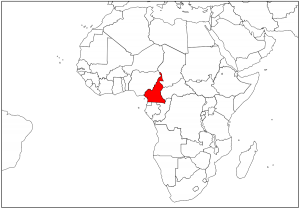 |
| Cameroon |
Background
According to the surveys carried out by National Institute of Statistics on Households between 2014 and 2016, the water-related diseases still remain rampant in the targeted area, though the water-related diseases in other areas in the country have improved. People living in Nkum Ekie village take water from a distant river from their village, and they use that water to wash dirty cloths, dishes, other materials and body. A lot of mosquitoes breed around the water source, which makes children and women at risk of malaria. Even the community health center does not have clean water supply facility.
Outputs
1)Coordination Meeting was held.
2)Workshop on water, sanitation and health was held.
3)1 well was constructed.
4)Water quality test was carried out.
Because of these activities, the people in Nkum-Ekie village could access to drinking water so that reduction of diseases due to contaminated water can be expected.
Voices from the beneficiaries
-
Mr. Pierre Longin, 30 years old, Founder of the Health Center
Water for life project is a salutary and humanitarian response to the crises of underprivileged populations. It has brought added value to CADAC and the medical center’s objectives, which are to relieve suffering and bring life to others; don’t they say that water is life?
I just want to express my gratitude to JWF for supporting this community, thank you. -
Mrs. Mbarga Aboui Marcelle, 38 years old, Women Leader
Actually this problem of dirty water has really been a pre-occupation in the community since most patients were often diagnosed with typhoid and dysentery due to the dirty water they consumed. Fortunately, illnesses as such are going to be rare in the community, thanks to the awareness workshop and the provision of a well. -
Mr. Ekomo François, 33 years old, President of the Youth Council
For the past years, we have had water problems in this community since we had just a stream from which the population fetched water. Sometimes they took their bath in this stream and this often left the water dirty and not good for drinking. Now, with the well we will benefit from the implementation of this project, parents and children will have safe access to good quality water. However with the deepness of the well, it will be good if you could provide us with a water pump when handing it to us.
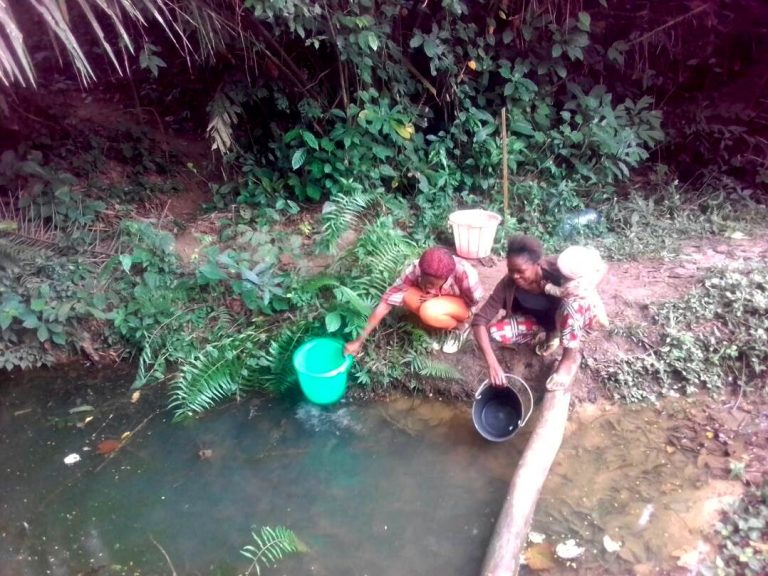 |
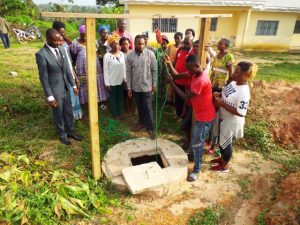 |
| Water source which residents use | Constructed well with beneficiaries |
2.Equipping Eshiru primary school with 1 block of 3 re-usable pit-latrines and 4 hand-washing facilities, and 1,200 pupils in the school with skills in hand-washing and importance of pit-latrines (Kenya)
Outline of the project
・Organization: Renewed Hope Group (RHG) (#054)
・Project title: Equipping Eshiru primary school with 1 block of 3 re-usable pit-latrines and 4 hand-washing facilities, and 1,200 pupils in the school with skills in hand-washing and importance of pit-latrines
・Country/Area: Kenya/Kakamega County
・Project period: October 2017 to February 2018
・Number of beneficiaries: 1,220 people (800 girls, 400 boys and 20 teachers)
・Cost: 1,339 USD (JWF Fund 1,000 USD, contribution from beneficiaries 199 USD and contribution from RHG 140 USD)
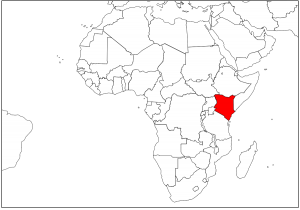 |
| Kenya |
Background
Eshiru public primary school, which has 1,200 poor pupils, has only 2 pit latrines to be fully filled up after half a year. Pupils have to stand in a queue to use existing pit-latrines during break or lunch time. As a result, most of them delay returning to classes and often defecate open in bushes around the school to catch up with time. Pupils do not have enough knowledge about importance of using pit-latrines and hand-washing. In addition to that, the school lacks hand washing facilities. At-least 4 out of every 10 children in the school are infected with water-borne diseases every year, therefore, local public health authority regularly closes down the school temporarily.
Outputs
1)Project Implementation Committee was established.
2)3 VIP pit latrines and 1 urinal unit were constructed.
3)4 hand washing facilities were installed.
4)2 training workshop on water and sanitation were held.
5)Operation and maintenance framework was established.
Because of these activities, teachers and pupils could use sanitation facilities, school environment can be improved.
Voices from the beneficiaries
-
Ms. Angela Simiyu, 13 years old, pupil of the school
I really enjoy using the newly constructed VIP latrines in our school. I will no longer visit bushes around our school for call of nature. -
Mr. Tom Khaoya, 12 years old, pupil of the school
The training in the project has been of a great importance to us as a school as we have got knowledge on use of pit-latrines and hand-washing and how it prevent waterborne diseases among us; and this coupled with new constructed 3 VIP pit-latrine block boosts hygiene and eliminates further cases of outdoor defecation in bushes around and inside our school. -
Mrs. Janet Wasike, 34 years old, teacher of the school
Teaching at the Eshiru primary school has now become enjoyable and without interference since cases of waterborne diseases among pupils are slowing down, foul smell as a result of outdoor defecation has drastically reduced and pupils can now return to classrooms on time after breaks since there are no more congestion on queues to use pit-latrines
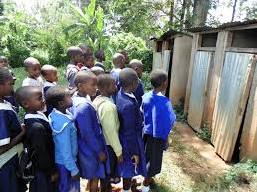 |
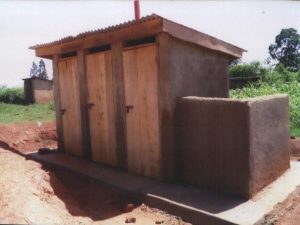 |
| pupils waiting for the latrine | Constructed VIP pit latrine |
3.Promoting access to safe water in Luyekhe community through construction of 1open spring well with insalubrious water (Kenya)
Outline of the project
・Organization: Ufanisi Women Group (#031)
・Project title: Promoting access to safe water in Luyekhe community through construction of 1open spring well with insalubrious water
・Country/Area: Kenya/Bungoma County
・Project period: October 2017 to February 2018
・Number of beneficiaries: 750 people (150 women, 150 men and 450 children)
・Cost: 1,389 USD (JWF Fund 1,000 USD, contribution from beneficiaries 258 USD and contribution from Ufanisi Women Group 131 USD)
 |
| Kenya |
Background
About 150 households live in Luyekhe community and they use water from a heavily contaminated open spring. This water source is not protected well and people defecate open, therefore human excrete and other wastes flow into the spring. People consume the water without treatment. This leads to water-borne disease such as diarrhea and deaths. Almost half of the people in the community visit local clinics. Public health authority occasionally closes down community’s school due to outbreak of the diseases.
Outputs
1)Project Implementation Committee was established.
2)1 spring well was protected.
3)3 training workshops on water and operation and maintenance were held.
4)Operation and maintenance framework was established.
5)Water quality test was carried out.
Because of these activities, the people in the Luyekhe community could access to water, reduction of diseases caused by contaminated water can be expected.
Voices from the beneficiaries
- Mrs. Anna Molaba, 34 years old, volunteer community health officer
The outbreak of waterborne diseases is now a thing of the past after protection of Luyekhe spring well, meaning that the community is now healthier and richer because their cumulative expenditures on medication has gone down. -
Mrs. Sarah Mumbua, 25 years old, small scale farmer
The now available water at one’s disposal has improved our self-image as a community, saved our time to work on our farms and put us in good books with the public health personnel and our neighbors. - Mr. Geoffrey Asombi, 28 years old, community leader
The project has provided safe and cleaning water to over 1050 residents in Luyekhe community, who previously drunk polluted and contaminated water that often resulted in debilitating and deadly waterborne diseases among them. The hospital beds in our health centers were previously occupied with patients hit by waterborne illness. We spent a lot of money and time seeking medication for water related diseases in this community, and now Japan Water Forum’s Fund via Ufanisi Women Group’s Luyekhe spring well project has provided lasting solution to the problem.
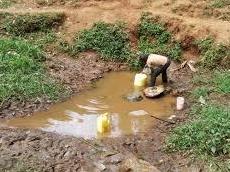 |
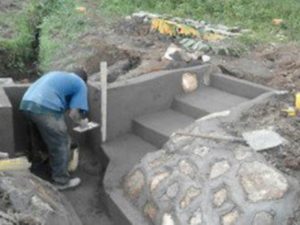 |
| Residents collecting water from contaminated water source | Construction of facility to protect the spring well |
5.Repair of wells, bore wells, awareness on hygiene and training program in repair of bore wells to unemployed youth (India)
Outline of the project
・Organization: Rural Action In Social Emancipation (RAISE) (#047)
・Project title: Repair of wells, bore wells, awareness on hygiene and training program in repair of bore wells to unemployed youth
・Country/Area: India/Andhra Pradesh State
・Project period: October 2017 to March 2018
・Number of beneficiaries: 230 people (80 women, 100 men and 50 children)
・Cost: 1,030USD (JWF Fund 1,000 USD and contribution from RAISE 30 USD)
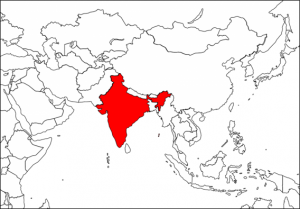 |
| India |
Background
Most of the people in targeted village belong to lower class and they are illiterate. The village has shallow wells and bore wells which were constructed a few decades ago. The shallow wells have become dirty due to ignorance of proper usage, which leads to various water-borne diseases such as dysentery, diarrhea, amoebiosis, and hepatitis. In addition to that, water in the wells mingled with mud due to aging of the boreholes.
Outputs
1)Repairing and cleaning of 5 wells were conducted
2)2 awareness camps on sanitation and hygiene were held
3)Training on operation and maintenance was held
4)Water Quality Test
Because of these activities, the people in the village could access to safe drinking water so that reduction of diseases caused by contaminated water can be expected.
Voices from the beneficiaries
Beneficiaries are very happy with the project which helps in promoting the health of the rural people. It brings confidence in them that it is a sustainable support because youth have been trained. They are very thankful to JWF.
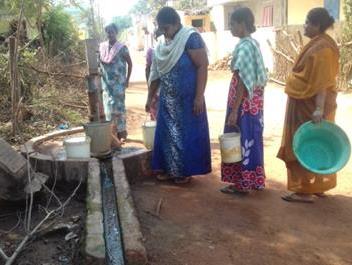 |
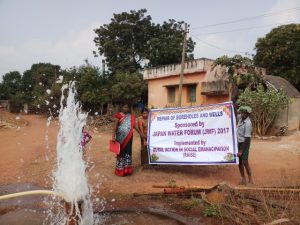 |
| Water in bore well mingled with mud | Cleaning of the well |
6.Ensure child education through construct a hygienic latrine & water supply (Bangladesh)
Outline of the project
・Organization: BASCO Foundation (#157)
・Project title: Ensure child education through construct a hygienic latrine & water supply
・Country/Area: Bangladesh/Magura district
・Project period: October 2017 to March 2018
・Number of beneficiaries: 80 people (24 girls, 16 boys and 40 women)
・Cost:1,365 USD (JWF Fund 1,000USD, contribution from beneficiaries 125 USD and contributions from BASCO Foundation 240 USD)
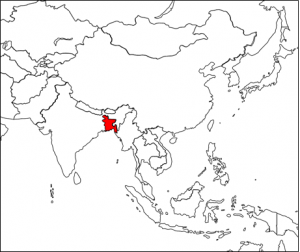 |
| Bangladesh |
Background
In Roygram village, there is no public private primary school. There is only one primary school with 40 children which local communities are operating. As this school cannot get any support from government, it does not have any facility for water and sanitation. Therefore, the students defecate at open field and drink dirty water. Especially girls are unwilling to defecate open, therefore they do not want to go to school. It makes many girls drop out of school and their parents reluctant that their daughters go to school.
Outputs
1)1 pit latrine and 1 hand tube well were installed.
2)Water and sanitation committee was established.
3)Workshop on usage of facilities and health education were held.
4)Water Quality test.
Because of these activities, the students and guardians could use water supply and sanitation facilities, school environment can be improved.
Voices from the beneficiaries
-
Mrs. Rimi Khatun, 8 years old, student of the school
My name is Rimi Khatun and I am in class two in this school. Before constructing latrine and tube-well, we have faced many problems. At school time, we drank dirty water and defecated at open field or jungle. But now we have no tension because Japan Water Forum and BASCO Foundation constructed a hygienic latrine and a tube-well. So we are very happy. We will come to the school and live free from water born disease. God bless you. - Mrs. Ruma Begum, 34 years old, guardian of a student
I am very much pleased for the installation of hygienic latrine and Tube-Well for the benefit of their children. As their children will safe from water born disease. Also their female children will be able to defecate at isolated place without tension. It is a good reward for us. -
Mrs. Joshna Begum, 32 years old, guardian of a student
Firstly, I am giving thanks to BASCO-Foundation and JWF for their kind visual fruitful option on safe drinking water and hygienic latrine for the school students of Raygram village. It will help the students to live free from waterborne diseases. Also the other people will be able to drink safe water .It was a dream to us to get those options.
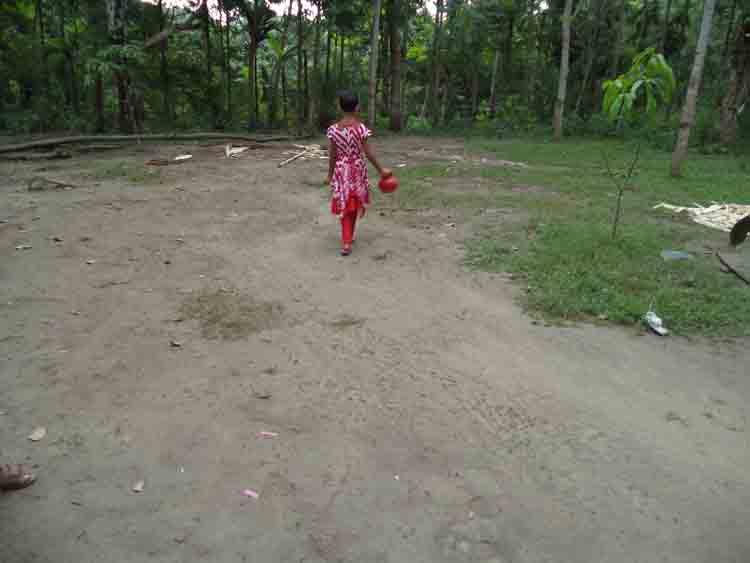 |
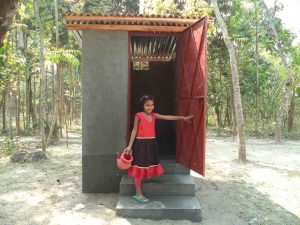 |
| Pupils going to bushes to defecation | Constructed pit latrine |
6.Rainwater Harvesting Project (Philippines)
Outline of the project
・Organization: Asset-Based Community Development with Equity Foundation (ABCDE Foundation) (#108)
・Project title: Rainwater Harvesting Project
・Country/Area: Philippines/Zamboanga del Norte
・Project period: October 2017 to March 2018
・Number of beneficiaries: 240 people (109 boys , 123 girls and 8 teachers)
・Cost: 1,121 USD (JWF Fund 1,000 USD、contribution from ABCDE Foundation 121 USD)
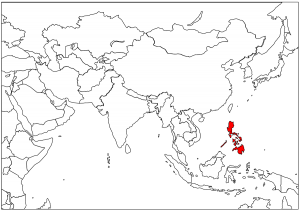 |
| Philippines |
Background
The project site is mountainous and water source such as springs and creeks are far from the site. People have to down hills to fetch water and it takes around 1.5 hours. It is difficult for women to fetch water out of the distant water source and wash clothes every day. Severe lack of water has affected health, hygiene and the economic condition of local people.
Outputs
1)Courtesy call was conducted.
2)2 rainwater harvest tanks were installed.
3)Barrio Water Association was established.
4)Trainings on water management and vegetable gardening were held.
Because of these activities, the community people could use sustain water source, their living environments can be improved.
Voices from the beneficiaries
-
Mr. Nonie Sumarap, 31 years old
The rainwater harvester is indeed a blessing for me, my family and our community since we are able to get access to water for our personal needs. -
Mrs. Dionesia Anigan, 42 years old
I am a gardener and I love to raise vegetables for home consumption and for sale with my neighbors. My problem before is that I used to fetch water from a long distance. With the water harvester, that problem is solved now -
Mrs. Maredel Segayo, 26 years old
I recently gave birth to a son and badly need water for personal hygiene and in order to cook food for my baby. The rainwater harvester is indeed a big help for me.
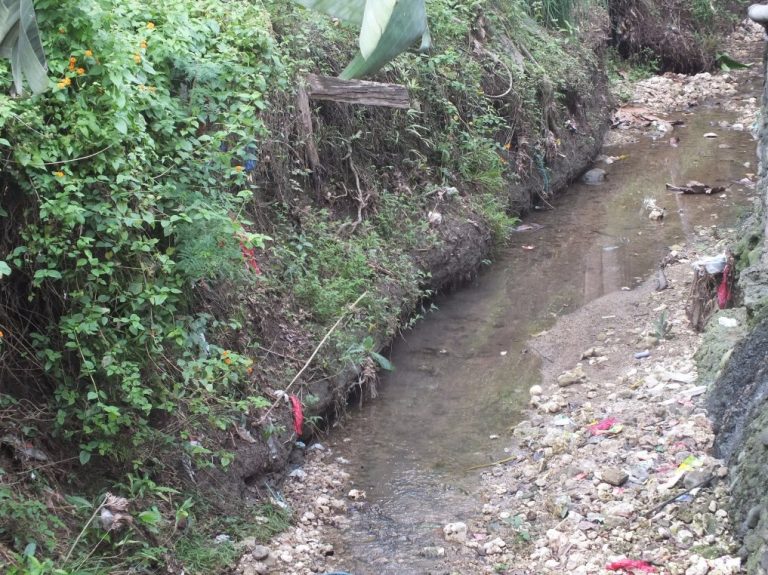 |
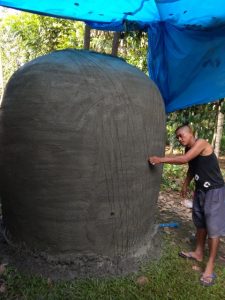 |
| Pupils going to bushes to defecation | Construction of the rainwater harvesting tank |
7.Improving access to water and enhance communities awareness on sanitation in Gursum district, Quramatana kebele (Ethiopia) (report unsubmitted)
Outline of the project
・Organization: Nurture Education and Development (NED) (#133)
・Project title: Improving access to water and enhance communities awareness on sanitation in Gursum district, Quramatana kebele
・Country/Area: Ethiopia/Somali region
・Project period: October 2017 to February 2018
・Number of beneficiaries:1,040 people (420 Women, 350 men and 270 children)
・Cost: 2,199 USD (JWF Fund 1,000 USD, contribution beneficiaries, NED and district water office 1,199 USD)
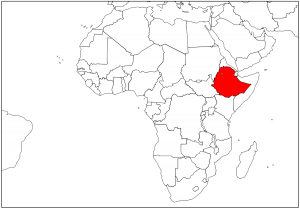 |
| Ethiopia |
Background
In the targeted area, there is high scarcity of water supply system and sanitation facility, therefore, water and sanitation is in a severe condition. Women and girls have to spend more than 2 hours to fetch water from a distant small river with riding donkey. However, people wash their clothes and bodies and defecate open around the water source. In addition to that, animals also use that water source. As a result, people are exposed to water-borne disease such as cholera, diarrhea, and typhoid.
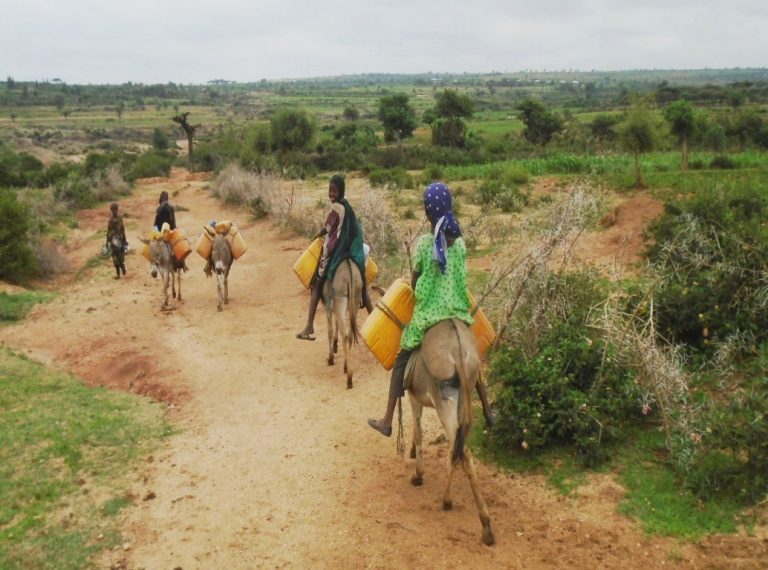 |
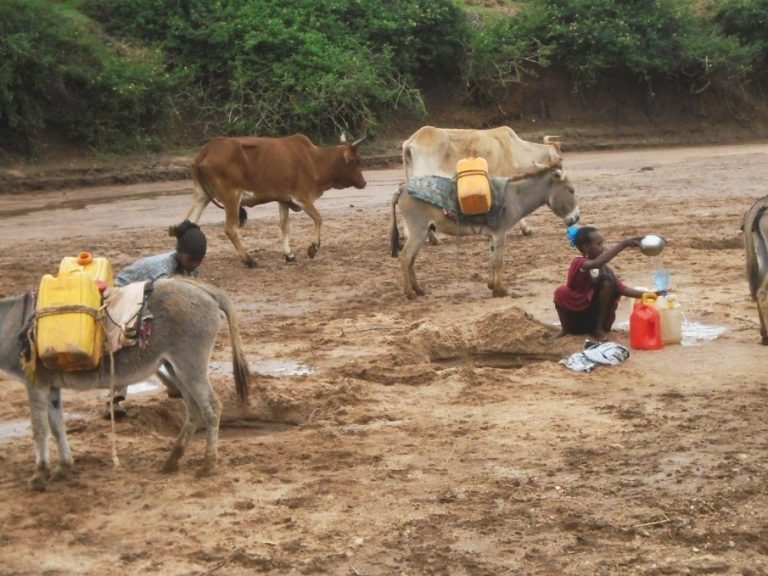 |
| People heading the small river riding donkey | Animals using the water source |
In 2 April 2018, we have received an message from Mr. Demissew Abi of NED that this project has not been completed due to domestic conflict of ethnic groups and instability of government.
As of May 31, 2018, reports from NED have not been received. Details are under investigation.
(Reported by Akie Gunji, Manager)
